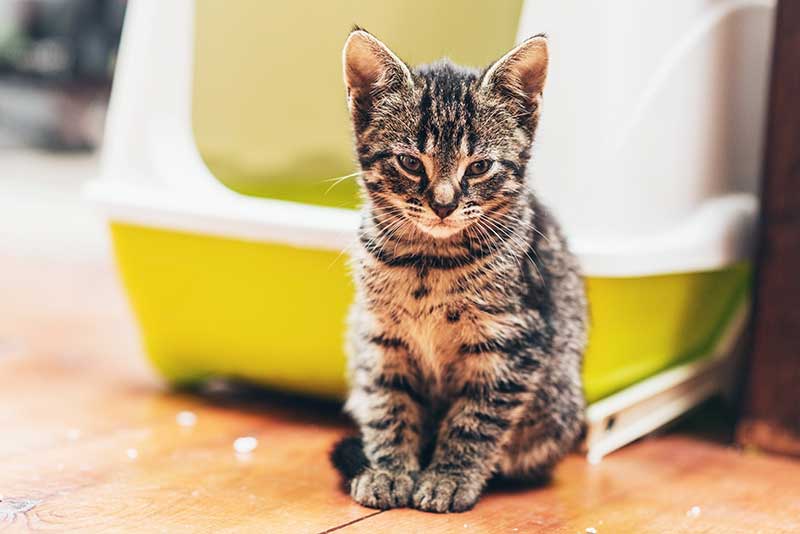Does your cat pee outside the litter box?
THE ROOT OF THE PROBLEM COULD BE MEDICAL OR BEHAVIORAL.
Urinary problems can be urgent and life-threatening, but are often treatable with a prompt visit to the vet and a few lifestyle adjustments.
What to look for:
• Frequent trips to the litter box
• Peeing outside of the litter box
• Passing little or no urine
• Crying in the litter box
• Blood in the urine
If your cat has at least one of these symptoms, see a vet immediately to rule out medical causes.
BEHAVIORAL ISSUES
Cats pee outside of the litter box for a variety of reasons.
• They may be avoiding a box which is too dirty, has the wrong type of litter, or that they feel is in an “unsafe” location.
• Since cats are territorial by nature, they may also feel stressed by other pets or humans in their space and use urine as a way of “marking” the territory with their pheromones.
Feline lower urinary tract disease (FLUTD)
One common cause of litter box avoidance is Feline Lower Urinary Tract Disease (FLUTD). Cats with FLUTD may have a bacterial bladder infection, form struvite crystals in their bladder, or simply have painful inflammation in their urinary tract. FLUTD can occur in both male and female cats of any age. In males, it can cause a urinary blockage, which is life-threatening and requires emergency veterinary intervention. Females are more susceptible to bacterial infections, though they are less likely to suffer from a blockage.
More information about urinary tract diseases in cats can be found at catinfo.org.
Supplements for Urinary Health
For cats prone to bacterial infection: supplements containing blueberry or cranberry can help prevent harmful bacteria from attaching to the bladder wall.
For cats prone to developing struvite crystals: our own supplement,
Enzymes for Cats, contains acidifying Vitamin C as well as cranberry and highly active digestive enzymes.
For cats with recurring urinary tract problems: Animal Essentials Tinkle Tonic is an herbal tincture that helps to reduce inflammation and irritation in the urinary tract, easing discomfort and supporting healthy urination.
FEED A DIET HIGH IN MOISTURE & MEAT
As obligate carnivores, cats thrive on high-moisture food composed mainly of meat – much like their natural diet of juicy prey. Meat makes a cat’s urine naturally acidic, and moisture helps dilute it. Together, they keep mineral waste dissolved in the urine so it can be flushed out of the body.
Cats who eat only dry food (which is low in both meat and moisture) have more concentrated, alkaline urine, which enables the formation of struvite crystals. The best diets for cats to help prevent urinary problems are raw and canned foods, which contain more meat and moisture than dry food.
Set Your Cat Up for Litter Box Success
Keep several litter boxes in different locations, and scoop daily.
A good rule of thumb is to have as many litter boxes as you have cats, plus one more. They should be kept in different locations, with at least one litter box on every floor of your home.
Try switching your cat’s litter.
Some cats can be very particular about their litter. Those with a small grain size, such as clay, are the most universally acceptable. For stubborn cats, consider trying a product specially formulated to attract cats to the litter box.
Managing Stress
CATS ARE TERRITORIAL
They can become stressed in shared spaces, which may cause them to pee outside the litter box. Fortunately, there are many ways to make your kitty feel more secure.
MAXIMIZE SPACE
Adding strategically-placed cat trees gives your cat more territory by creating vertical space for climbing and perching. Additionally, cat trees provide visual vantage points that allow cats to survey their domain. You can also add hiding spots, such as enclosed beds or boxes.
PROMOTE A PEACEFUL ENVIRONMENT
Pheromone plug-ins can be used to reduce tension in multi-cat households. Using a pheromone spray where the cat is peeing inappropriately can also deter urine marking.
HEMP CBD MAY EASE STRESS
Wisely CBD can provide all-natural, drug-free calming.
CLEANING URINE
When cats urinate, they release strong pheromones which serve as a scent marker to establish territory. Smelling these pheromones can encourage a cat to continue to urinate in the same place. Remove these pheromone markers by using an enzyme-based stain & odor remover specially formulated for cats. After blotting up as much urine as possible, use the stain & odor remover to fully saturate the urine stain. Cover the area with a clean, damp rag to prevent evaporation, and let it sit overnight, then blot with a clean, dry rag.

